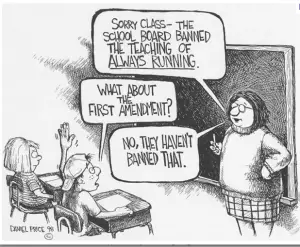 Freedom of speech. This phrase is bandied about by politicians, on the left or right; singers; bloggers; TV talking heads; everyone is using the first amendment as a jumping point into other arguments. What *is* the first amendment of the constitution? What did the framers write that is continuously argued about ?
Freedom of speech. This phrase is bandied about by politicians, on the left or right; singers; bloggers; TV talking heads; everyone is using the first amendment as a jumping point into other arguments. What *is* the first amendment of the constitution? What did the framers write that is continuously argued about ?
“Congress shall make no law respecting an establishment of religion, or prohibiting the free exercise thereof; or abridging the freedom of speech, or of the press; or the right of the people peaceably to assemble, and to petition the Government for a redress of grievances.”
Yep, that’s it, that tiny paragraph is responsible for what our republic holds so dear. And, speech isn’t the only right covered. It spreads rights around like butter on bread. No state religion, no exclusion of a religion, no quashing a hostile press, if a crowd peaceably assembles, fine, and the government must be held accountable for wrongs committed and reparation made.
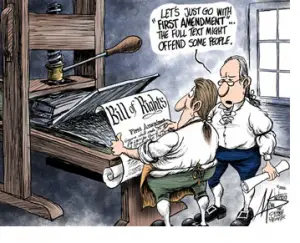 Constitutional lawyers have argued the finer points of this amendment since first written. The rights sail back and forth like badminton. It’s original narrow perimeters have been slightly expanded. And then restricted, and then expanded. Depends on what 9 judges are on the Supreme Court. And the political position at that particular point in history.
Constitutional lawyers have argued the finer points of this amendment since first written. The rights sail back and forth like badminton. It’s original narrow perimeters have been slightly expanded. And then restricted, and then expanded. Depends on what 9 judges are on the Supreme Court. And the political position at that particular point in history.
One thing has remained fairly certain, books are protected within free speech, as long as those books do not have child porn, or the child porn doesn’t go through the mails. Basically, don’t go anywhere near child porn, which one would hope 99 per cent of the population don’t.
I remember handing out flyers for a shoe store (a right that wasn’t allowed a one point–commercial free speech was restricted) and seeing lots of tables full of books along the sides of incredibly busy streets, yet no food vendors or the like were allowed. I had no idea why this was–and I asked a book dealer. He informed me that books are protected by the first amendment and that selling them anywhere you want is permissible. I still find this hard to believe, but bookmen are there selling on blankets, from boxes, in parks, alleyways, on the corner of Fifth and 57th in front of Tiffany’s.
But, how does complaining about a specific book and wanting that book removed from government property work? I’m not sure, I don’t know if this particular problem has been before the high court, but I would think that since books fall under the first amendment and that the government, local or federal are in control, they would be in violation of the amendment if say a school or library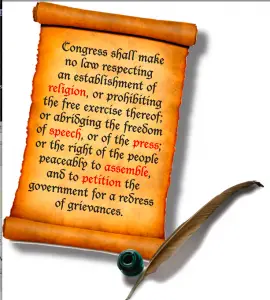 arbitrarily kept certain titles from students or readers. And yet, books are banned all the time in this country. And, no child porn is involved. So what *is* covered? Is there a difference of pulling a book from a public library because one person or a couple don’t like it, as opposed to not allowing the title to be sold? I guess so. Freedom means you can publish anything you like that doesn’t have child porn or have extreme hate speech, although even that is iffy. And people can buy it. But the very government that gives you this right decides which books the public can and can not have access to, for free. Am I interpreting this right?
arbitrarily kept certain titles from students or readers. And yet, books are banned all the time in this country. And, no child porn is involved. So what *is* covered? Is there a difference of pulling a book from a public library because one person or a couple don’t like it, as opposed to not allowing the title to be sold? I guess so. Freedom means you can publish anything you like that doesn’t have child porn or have extreme hate speech, although even that is iffy. And people can buy it. But the very government that gives you this right decides which books the public can and can not have access to, for free. Am I interpreting this right?
So local tax that has paid for libraries and school systems can and do decide what books to stock, and what ones they don’t want. Well, it does seem reasonable. Libraries aren’t capable of having every book ever written, especially now that so many are self pubbing, ha. But here’s the rub, as a banned Shakespeare would eloquently say; who has the right to tell the rest of the township which books will NOT be allowed and if it’s a governing board, then what is their criteria? And, if there is a board in place for the school, and the teachers are responsible for the curriculum, with the board’s oversight, what rights does anyone else have in regards to freedom of speech in terms of a specific book? And in a republic, when the majority rules, what power, if any, should a few have in regards to the disputed book?
Following the ideals of the first amendment, and assuming that majority still rules, then handing a few people the power to dictate books to local school systems seems anti free speech, if not technically so. But how would a few people be in the position to dictate? Free speech! Every individual is given the right to speak their mind, which is why the disgusting so called ‘religious’ group who go around shouting obscenities at fallen soldiers funerals are allowed to do so. Why Nazi’s can march down the street. Why anti-war protesters can assemble. And why a mini amount of individuals can expound upon a book and share their opinion of such book, and demand it’s removal from library or school. And why those who oppose the banning of same book can speak just as forcefully and loudly.
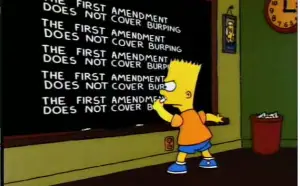 So back to who decides? The government, of course, the school board, the library’s board. They represent us, we elect them, they are given the power of speaking on our behalf. All of us. Once the arguments are cleared, they are given the task of deciding what their constituency wants.
So back to who decides? The government, of course, the school board, the library’s board. They represent us, we elect them, they are given the power of speaking on our behalf. All of us. Once the arguments are cleared, they are given the task of deciding what their constituency wants.
And here’s where the right of the majority and their free speech is thwarted. It has become a common practice by school boards and libraries to avoid issues such as these like the plague. And the way they see to do this, is submit at the slightest whisper of dissent–even if by a lone voice.
Should the voice be heard, of course. Does that mean the voice should tell the powers what to do and they obediently do it? No. The rights of the people, those who also vote, those who also pay taxes, those who also have freedom to speak and who are not yelling censorship should be considered. Just because their voices aren’t screaming or on TV, doesn’t mean they shouldn’t be reckoned with.
To use a wonderful well known advocate of censorship, Richard Nixon, what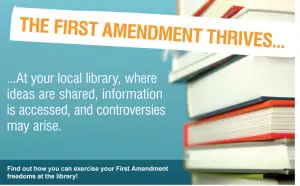 about the ‘silent majority?” That’s just it. They’ve been way too silent. If more people would voice their rights, perhaps less schools, libraries, etc., would feel compelled to fold to the first person up in arms over some book. And if the majority agree the book should be banned? I have to believe that it is still unconstitutional to ban a book, but considering apparently it isn’t, there goes my argument. If we elect people to speak for us, and we speak to them, and we say–ban the book, it is within their rights to ban the book. As disgusting as this is, I have to see that the first amendment apparently only goes so far in terms of the right to free speech via books within local or federal government establishments.
about the ‘silent majority?” That’s just it. They’ve been way too silent. If more people would voice their rights, perhaps less schools, libraries, etc., would feel compelled to fold to the first person up in arms over some book. And if the majority agree the book should be banned? I have to believe that it is still unconstitutional to ban a book, but considering apparently it isn’t, there goes my argument. If we elect people to speak for us, and we speak to them, and we say–ban the book, it is within their rights to ban the book. As disgusting as this is, I have to see that the first amendment apparently only goes so far in terms of the right to free speech via books within local or federal government establishments.
If I’m wrong about this, please tell me! And how I’m wrong, and then how to stop the banning of books from schools when the majority want it so.
But, and it is such a big but, if the majority speak their minds to the people they elected to answer to their voices, and they say, no banning of the book–then no less than the majority should have the power to pull a book from a curriculum.
In other words–2 people do not have the power to dictate to the majority what book should or shouldn’t be included by the teachers who were hired to create curriculums. And set into place by the school board.
But, sadly, this is not always the case and small numbers of insistent extreme voices drown out the silent or quieter ones quite often. And we who stay silent or quiet in the face of our freedom of speech being corrupted have only ourselves to look to when the next book banned is one of our favorites.
 So, next time your local library has a few people shouting about the pornography of Ulysses, start yelling back, make it clear that you also have the right to speak and more so, the right to borrow a classic from the library you pay for. And hold your school board responsible if they ban a title because of one or two or ten people think Huckleberry Finn is racist. The only way this free speech thing works, is if we–all of us–use it.
So, next time your local library has a few people shouting about the pornography of Ulysses, start yelling back, make it clear that you also have the right to speak and more so, the right to borrow a classic from the library you pay for. And hold your school board responsible if they ban a title because of one or two or ten people think Huckleberry Finn is racist. The only way this free speech thing works, is if we–all of us–use it.

Dear Diane:
The following is a quote from your previous post, skewering me for protesting against the graphic oral sex scene, graphic masturbation scene, and graphic public masturbation scene by circus prostitute for Johns, in Water for Elephants. I asked you several times if you would have a problem if the circus prostitute was eight years old. You have failed to answer that question directly.
However, you did say that above that freedom of speech does not apply if we are talking child porn. So, you admit that there are limits to the speech. However, in your previous post, you suggest strongly that parents should never object–ever. If you admit that we have the right to object, are you saying that it is only to child porn?
Since you have screamed out the below question, I will answer it for you. We are the parents of the children. We have our hopes and dreams in them. We have sacrificed to raise them. We will be the ones there when they succeed or fail. The teachers and administrators care so very little for our children, relatively speaking. Our children are a captive audience for whatever garbage the teachers care to share that day. Most of them realize this and try to reign in their tongues. Most realize that the kids are not their for political reeducation. Some, however, think that they can offer whatever they like–at taxpayer expense and potential student damage. Giving porn to kids is insane and violates the “in loco parentis” status that the school claims it maintains. I would fire a babysitter who showed my boys a Penthouse, and I sure would like to fire or have fined, the teachers behind Water for Elephants. Why give the kids the garbage when an alternative is available. Buy the trash for your own kids and let the school teach academics, not sexual technique and sexual mores.
Again, why scream at your choir of liberal listeners??? They already agree with you.
“I’ve asked this before, and I still can’t find an answer; why does ANYONE outside the teachers and admins have any say over the books in school libraries and various courses? My guess, because we live in a world so afraid of its shadow, that schools no longer stand up for themselves. They cow-tow to whatever crackpot nitwits so freaked out about sex that they must publically make fools of themselves by demanding the book be banned.”
Dennis. You have not addressed the issue of free speech. Are you submitting that what you call liberals (and you’ve no idea what political leanings I have,) are the only ones who care about maintaining the right to voice their opinions and keep the first amendment? That certainly cannot be the case, since you are constantly voicing yours, and I would gather from earlier comments that you are not bearing to the left.
Your parenting has nothing whatsoever to do with the exercising of free speech. What you give your children as lessons to go forward in life is your personal business.
What teachers and school boards do is everyone’s business, but not under one or two people’s control. Freedom of speech isn’t just a right that you possess, if you have it, then everyone does, and in submitting that a book for an elective class is objectionable on the basis of sexual content and should be banned, is your right as an American citizen. Your rights end there. Your constant repetition of the few areas of ‘cock sucking, tit twirling, etc etc’ within the book, is porn or obscene is only, *your opinion*, and demanding it be removed from an elective course other parents feel comfortable their child can handle, is stamping on *their* rights.
Just because one or two or three or whatever believe the sky is green, doesn’t make it so. Just because in your troubled mind sexual content as in Water for Elephants is child porn, doesn’t make it so. Especially since there are no children characters in the book, and certainly none involved in sexual acts, and that, according to the Supreme Court, is what qualifies as child porn. If Water For Elephants qualifies as obscene literature, then so would too many books to be listed here. And yet, none are banned by the Supreme Court, are they? You have stretched reality of what is actually in this book, to extend to fantasy—what if’s are not part of the first amendment.
Your argument keeps relying on your own opinion, not the law. You keep railing about how awful the book is, and yet you admit except for the ‘dirty parts’ it is perfectly fine. To be labeled obscene, according to the Supreme Court, the work must be all prurient with no redeemable quality—I’m paraphrasing here-according to the prevailing sentiment of society at the time. As this is not a place in history where books such as Ulysses were considered by countries like Ireland to be profane. Water For Elephants wouldn’t even register today on the Richter scale of obscenity. This is not opinion, this is how the Supreme Court has decided what is and what is not obscene, as broad and uneven as it may seem.
Again, and I feel I am beating a dead horse, poor thing, your opinion that this book isn’t worth being read by high schoolers and that there are so many other better books out there, is not relevant to the issue of free speech especially in regards to printed material being read as a choice. A free choice, not required, not forced upon all students, but something teens and their parents can discuss and decide whether or not they feel it would be a good read. If you are worried your child would be disturbed by the book, don’t sign up for the class, have him read something more akin to his maturity level. Not all 13 year olds are at the same point, maturity wise. Many families have discussed openly sexual experiences ahead of the time when their children would be experiencing, hearing, or reading about them. And explained the difference between sexual acts, and having loving sex. If you’ve not had that conversation with your son, or if other parents don’t feel their children would be comfortable reading it, then fine, no problem, opt out. Of course more mature 13 year olds and older teenagers who are perfectly mature enough to handle the few sexual scenes are being keep from their first amendment rights because your child isn’t. Your child’s immaturity on this subject or lack of knowledge which you believe would cause him to loose his ‘innocence’ long before he should, again, has no bearing on whether other children whose understanding of reality has neither lost them their innocence nor made them into sexual fiends. Because of your personal fears for your child, the first amendment right to read a book they would find entertaining, historical, interesting, touching, adventurous, and a true deep love story of two people who find themselves and go on to live their entire lives married to one another, is being denied.
Your insisting and insisting that they have no rights to decide for themselves is the antithesis of the first amendment.
I have yet to encounter this issue where I work – a tiny rural library, the smallest one of 18 in a tri-county cooperative. Our library members in the Amity community are, for the most part, conservative folks who attend church regularly and are raising (or have raised) children. (One regular library user home schools 4 kids; perhaps there are others.)
Folks read a wide range of books, including “Water For Elephants” and books which have similar controversial points— I have never encountered a single reader who has expressed a wish to remove a book on any grounds other than it being poorly-written or extremely worn-out. I have encountered at least 7 readers who have told me they do not choose to read books with explicit sex or gratuitous “bad” language. They do not say that book they found on our shelves is offensive morally or otherwise; they don’t care that other folks (neighbors, their kids’ teachers, their pastor or preacher, the mayor) read it, they don’t care if it’s my favorite or least favorite. But they will avoid reading it.
Many of our teen readers are not allowed to read books with magic & supernatural plots (like the Twilight & Harry Potter books), but the parents do not ask for the books’ removal. They care what their kids read and control that without telling their neighbors what they should read.
Most of our books are donations; it is a large part of my job to decide which books to keep, which books to sell/give-away. And it is the hardest part of my job but when I really don’t know, I’ll ask several regular readers what they think. We’ve always agreed (my vote is silent) and I am a liberal, non-church goer who is not raising children and reads books with ‘bad’ language and explicit sex scenes. When it comes down to it, the final criteria for our library is: the writing. Poorly-written? out you go! But would I personally ban a book or allow one to be banned? Never. Would I maintain a book is not suitable for our members? You bet. Shelf space is limited.
Nancy, hello. It is heartening to hear your experience. It makes me feel more what I honestly think, that most people are able to have opinions and likes, dislikes, but not infringe upon others’.
I laughed at ‘poorly’ written as being cause for chucking, lol. I can think of plenty of books that would qualify, but one thing I never did as a bookseller, give a book a bad review. If I hated it, I wouldn’t review it. And, most likely, I wouldn’t sell many either. But I also wouldn’t dissuade its purchase–money is the opportunity to stay in business and buy more ‘good’ books, lol.
Although my bad opinion of parents not allowing their children to read Harry Potter stands, I would never insist or harass anyone who made that choice. The kids will miss a lovely reading opportunity, but that’s not an area I have any control over, nor should I.
However, if an elective school class decided they would like to read and discuss the fictional world, and some parents wanted it banned, or not read, then I would use my first amendment rights to complain and demand hands off what I want my child to read.
It comes down to the fundamental first amendment again, no other person can dictate to you what you can and cannot read. I do love our founding fathers, and mothers, lol–who was home all day helping the kids to read–and their ability to set aside their own particular prejudices and opinions to make the constitution and bill of rights extend to everyone, even if at the time, blacks were slaves, women had no rights, most of the religious sects has some sort of Christianity. The broad spectrum of their wisdom allowed for the bill of rights to live and breathe and be interpreted exactly as it should be–no American citizen can be denied freedom of speech, press, religion, assembly or redress. Soooo many wars have been fought for these rights and so many have died to allow a few people to try and take them away.